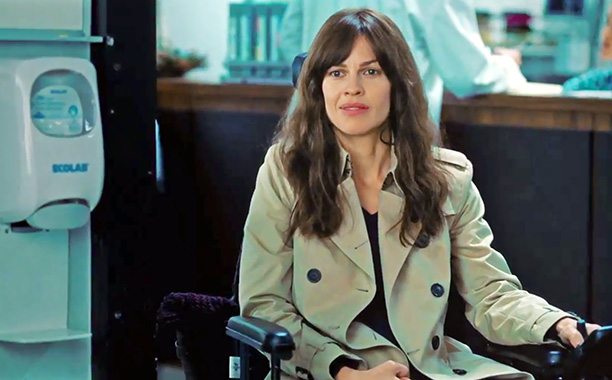
 Preparing a lush meal for dinner guests in her ultra-modern kitchen, Kate (Hilary Swank) loses her grip on a glass, sending it shattering down into the sink. Staring at her hand, the expression on her face says it all: something is wrong. Up until this moment, everything was perfect. Kate and her husband, played by Josh Duhamel, live well—great friends, great careers, and a beautiful home to hopefully raise a family in someday. After a grim ALS diagnosis, Kate’s perfect world is threatened by a growing list of things. Bec (Emily Rossum), her rugged new assistant, is one of those things. She serves to point out the things Kate once thought were perfect and reveal their true nature. In turn, Bec is ripped from her youthful antics and learns how to be an adult.
Preparing a lush meal for dinner guests in her ultra-modern kitchen, Kate (Hilary Swank) loses her grip on a glass, sending it shattering down into the sink. Staring at her hand, the expression on her face says it all: something is wrong. Up until this moment, everything was perfect. Kate and her husband, played by Josh Duhamel, live well—great friends, great careers, and a beautiful home to hopefully raise a family in someday. After a grim ALS diagnosis, Kate’s perfect world is threatened by a growing list of things. Bec (Emily Rossum), her rugged new assistant, is one of those things. She serves to point out the things Kate once thought were perfect and reveal their true nature. In turn, Bec is ripped from her youthful antics and learns how to be an adult.
You’re Not You zigzags between humor and heartbreak, as these two drastically different women form their unlikely bond. Kate and Bec certainly clash more than they mesh, which begs the question: Why keep Bec on the job? Why not find a better assistant to help her cope with such a debilitating disease? The film’s answer to this is a small moment in which Kate says something to the effect of: “I don’t feel like a patient with her.” It makes sense that someone so used to her own volition and caring for herself would hate being treated as a "patient." The biggest problem with the film is that the forming of this unlikely bond feels a bit inorganic at times. Hilary Swank and Emily Rossum power the film with their incredible acting abilities, but the script doesn’t give them a whole lot to work with. We get the gist of their personalities so our brains can fill in the blanks and proceed, but by and large, Bec’s character just feels like a vehicle for quirky zingers. And so a little more attention to the questions “Who?” and “Why?” would have made Kate and Bec’s friendship much more special.
Still, though, inorganic growth is still growth—otherwise the sunlamp industry would cease to exist. The filmmaker’s arm reaches in and forces these two polar opposites in a room together, and after enough time passes, they do start to understand what makes each other tick—as does the audience. The scenes in which Kate and Bec are relaxing with friends or are able to provide each other with an escape from their problems are the true triumphs of this film. Like Kate’s stemware in the sink, life is fragile and fleeting. It is difficult to watch a sufferer of ALS onscreen, however, there is a generally positive affirmation by the end of the film about how, as people, we desperately need each other.